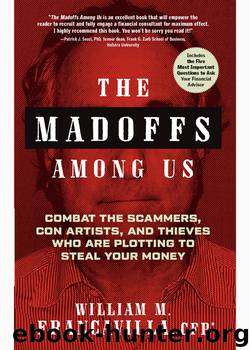The Madoffs Among Us by William M. Francavilla

Author:William M. Francavilla
Language: eng
Format: epub
ISBN: 9781632658791
Publisher: Red Wheel Weiser
The Strongly Opinionated
We want our advisors to be in the know when it comes to market conditions. It's one of the reasons we hire their expertise. We don't want them to be a “perma-bear,” one who is adamant about the impending market crash and can qualify his or her opinions with charts, history, and so forth. This advisor may be absolutely right, but people who portend to see the future are usually very, very wrong.
Likewise, we don't want a perma-bull who, regardless of current conditions, will always tell you that a long-term buy and hold strategy will consistently earn more appreciation. This advisor may be 100 percent correct as well, but remember that the self-proclaimed prescient personality will at some point implode. The expression “Even a broken clock is right twice a day” comes to mind. Invariably all people have certain preclusions relative to social, religious, and market conditions. But the only one of these that has a degree of quantification is the market because we can calculate our values daily.
As I continue to read and study markets, I am constantly reminded of the disparity of adamant viewpoints expressed by very intelligent experts. I don't doubt his or her path to conclusion but someone's going to be very wrong. For example, let's consider the musings of two market analysts, namely Jeremy Siegel, the Wharton School professor who wrote Stocks for the Long Run (McGraw-Hill, 1984), and Jim Rogers, who in 2013 wrote Street Smarts: Adventures on the Road and in the Markets (Crown Business, 2013). Both authors make very strong cases for their respective positions. Siegel goes back to 1801 and argues that a dollar invested in equities grew to $599,605. Bonds and gold grew to $952 and ninety-eight cents, respectively. Pretty conclusive, wouldn't you say? Rogers, on the other hand, makes the case for getting out and staying out of most equities going forward. He tells readers not to look to Wall Street but to rather look to Main Street America: “There's going to be a huge shift in American society, American culture, in the places where one is going to get rich. The stockbrokers are going to be driving taxis. The smart ones will learn to drive tractors so they work for the smart farmers. The farmers are going to be driving Lamborghinis.” He makes a compelling case for owning commodities, raw materials, and natural resources. And who can argue with a guy who cofounded the Quantum Fund (along with George Soros)? Between 1970 and 1980 the portfolio gained 4,200 percent while the S&P 500 Index advanced about 47 percent.1
Incidentally, the period from 2000 through the fall of 2016 saw stocks grow 42.1 percent.2 There are times, however, when gold and other asset classes such as bonds have grown far more rapidly. Are you willing to speculate, or are you satisfied with having your financial plan in comfortable positions?
I can make the case for either position. I can convincingly argue that an investor should or should not be positioned in either stocks or commodities.
Download
This site does not store any files on its server. We only index and link to content provided by other sites. Please contact the content providers to delete copyright contents if any and email us, we'll remove relevant links or contents immediately.
| Espionage | Hoaxes & Deceptions |
| Murder & Mayhem | Organized Crime |
| Serial Killers | White Collar Crime |
Mindhunter: Inside the FBI's Elite Serial Crime Unit by John E. Douglas & Mark Olshaker(9324)
Wiseguy by Nicholas Pileggi(5770)
Room 212 by Kate Stewart(5105)
Hitman by Howie Carr(5089)
Secrecy World by Jake Bernstein(4742)
Killers of the Flower Moon: The Osage Murders and the Birth of the FBI by David Grann(4441)
Papillon (English) by Henri Charrière(4263)
Breaking Free by Rachel Jeffs(4216)
Killers of the Flower Moon by David Grann(4043)
Say Nothing by Patrick Radden Keefe(3975)
American Kingpin by Nick Bilton(3876)
The Secret Barrister by The Secret Barrister(3699)
Molly's Game: From Hollywood's Elite to Wall Street's Billionaire Boys Club, My High-Stakes Adventure in the World of Underground Poker by Molly Bloom(3533)
Mysteries by Colin Wilson(3448)
In Cold Blood by Truman Capote(3378)
Signature in the Cell: DNA and the Evidence for Intelligent Design by Stephen C. Meyer(3132)
I'll Be Gone in the Dark by Michelle McNamara(3082)
Rogue Trader by Leeson Nick(3040)
Bunk by Kevin Young(2993)
